David Dubrow's Blog, page 14
April 26, 2018
Bits and Pieces 4/26/2018
I got the cover art for The Holy Warrior and the Last Angel, and it looks terrific. Fits in perfectly with the previous books. I’ll likely do a cover reveal before long.
Now that business is out of the way, let’s talk about some other stuff.
—
After watching a series of mediocre-to-terrible movies, culminating in the execrable ordeal titled Get Out, I got concerned that I may have just grown tired of movies in general. If tastes change, why can’t interests?
Pleasantly, I found that this is not the case after watching and enjoying Baby Driver. This was a fun movie. A bit long in the last third, but I couldn’t help but like all of it. It straddled the line between comedy and drama, not taking itself too seriously, and did what movies are supposed to do first and foremost: entertain. Not sure why John Bernthal got top billing; he was in the movie for five minutes at most. John Hamm rose above his Mad Men role to become a great guy to watch. Ansel Elgort was likable and vulnerable without being weak. Lily James had an ethereal, vintage beauty and charm that she used like a bludgeon, making you want to watch her and only her. Everything fit together well, everything was neatly done. (I even liked Kevin Spacey. Is that bad?) Overall, this is a rare film that lives up to the hype.
—
The story of Alfie Evans is absolutely brutal, and it underscores four important points:
There is a pernicious and disturbing tendency for far too many of us to place vitally important decisions wholly in the hands of “experts.” Experts have become the new royalty, now that social media has proven that the previous royalty, politicians, are as buffoonish and ineffectual as we always suspected them to be. Medical experts in the UK are starving a baby boy to death. If that’s the value of expertise, I want none of it.
This would not happen in the United States of America. Other citizens of other countries are subjects. We are a free people, born and bred. Rarely has such a distinction been so sharp.
The Second Amendment to the U.S. Constitution is part of the Bill of Rights precisely because of situations like Alfie Evans. Gun-grabbers love to talk about gun-free Utopias like those found in Europe, but they don’t seem to understand the vast cultural differences between the U.S. and, say, the United Kingdom.
History has ended for Europe, and its death throes are terrible to watch.
I pray God Alfie Evans can leave to find treatment. I pray for his family.
—
 The entire Starbucks situation is so bizarre, so ludicrous, that I can’t help but think we’re all being experimented upon by aliens studying human behavior in the 21st century. What happened is that two black men walked into a Starbucks and wanted to use the bathroom. The store manager told them they had to buy something before they could use the bathroom. They refused to buy anything. They stayed inside the establishment as non-paying non-customers. The store manager asked them to leave if they weren’t going to buy anything. They refused to leave. The store manager then asked the police to remove them. The police came and asked the non-paying non-customers to leave. They refused to leave. The police then handcuffed them and escorted them from the premises. The race card was thrown, successfully. Starbucks will now close down over 8,000 stores for an afternoon to teach their apparently racist employees how not to be racist anymore.
The entire Starbucks situation is so bizarre, so ludicrous, that I can’t help but think we’re all being experimented upon by aliens studying human behavior in the 21st century. What happened is that two black men walked into a Starbucks and wanted to use the bathroom. The store manager told them they had to buy something before they could use the bathroom. They refused to buy anything. They stayed inside the establishment as non-paying non-customers. The store manager asked them to leave if they weren’t going to buy anything. They refused to leave. The store manager then asked the police to remove them. The police came and asked the non-paying non-customers to leave. They refused to leave. The police then handcuffed them and escorted them from the premises. The race card was thrown, successfully. Starbucks will now close down over 8,000 stores for an afternoon to teach their apparently racist employees how not to be racist anymore.
I have a few questions about this situation that I’d like cleared up:
Who refuses to leave a private business when asked to by a representative of that business?
Why couldn’t one of them buy a $2.00 cup of coffee and defuse the entire situation? At that point they’d have gone from non-paying non-customers to paying customers. They could’ve then used the bathroom and sat there as long as they’d have liked.
Who refuses to comply with a police officer’s instructions?
Why is this a company-wide Starbucks problem instead of an individual problem? It’s like shutting down an entire town for a day because someone’s car was broken into. It makes no sense.
Is there anything better than washing down a hate-chicken sandwich with a hot cup of racist joe ?
Starbucks’ self-immolation is very much a red-on-red situation, and it’s fun to watch. And yet…kind of pathetic, also.







April 24, 2018
Movie Review: At Granny’s House
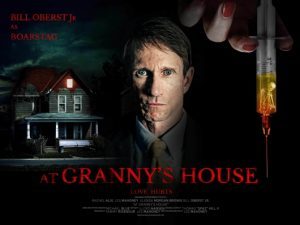 Because I hate myself and feel that I deserve to be punished, I reviewed the low-budget indie horror film At Granny’s House at The Slaughtered Bird:
Because I hate myself and feel that I deserve to be punished, I reviewed the low-budget indie horror film At Granny’s House at The Slaughtered Bird:
The story’s about an old lady whose ass hole son hires a caretaker (I spelled “ass hole” with a space in the middle because it’s funnier that way), and said caretaker turns out to be a homicidal maniac. The caretaker is named Rebecca. The old lady is named Marion. She’s the “Granny” in the title, despite having no grandchildren. Yes, I know it’s a niggling detail. Nobody wants to watch a movie titled, At Old Lady With No Grandchildren’s House. Well, I didn’t want to watch a movie that was so poorly made, so we’re all suffering. Anyway, Rebecca has a case of the ass about rude people who spend a lot of time on their phones, so she sneaks into their room at night and murders them. Then she falls in love with a less-rude houseguest named Ted, played by writer/director Les Mahoney, and they become a murder couple together. With Granny/Not-Granny’s tacit approval.
Click to read the entire review…
If you dare!







April 17, 2018
Movie Review: Get Out
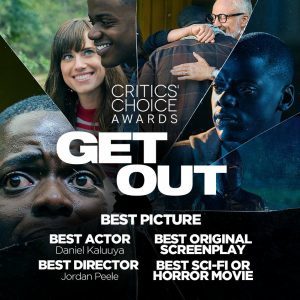 I need to talk to my cable TV provider and complain about the terrible service I received. My wife and I sat down on movie night to rent a film that got a 99% positive rating at Rotten Tomatoes, a film that critics called, “clever,” “anti-racist,” “brilliantly effective,” and “entertaining.” What we watched was banal, unfunny, angry, and unsubtle. What we ordered wasn’t what we got.
I need to talk to my cable TV provider and complain about the terrible service I received. My wife and I sat down on movie night to rent a film that got a 99% positive rating at Rotten Tomatoes, a film that critics called, “clever,” “anti-racist,” “brilliantly effective,” and “entertaining.” What we watched was banal, unfunny, angry, and unsubtle. What we ordered wasn’t what we got.
We ordered Get Out.
What the movie lacked in entertainment value it made up for in revelation: it turns out that black progressives hate progressive white people at least as much as they hate normal American white people. That’s the general takeaway, but there are other lessons this film teaches. I’m going to give away plot points, so if you haven’t seen Get Out and want to, click here and find something else to read for a while.
The story borrows elements from The Island and The Clonus Horror: rich old people stealing other people’s bodies/organs so they can live forever, or at least longer than they might otherwise. In Get Out, instead of just rich people stealing organs, it’s rich old white people stealing entire black bodies. The whole enchilada, so to speak.
You see, Rose, a white girl, invites her black boyfriend Chris to meet her parents for the first time in upstate New York. She’s never told them that Chris is black. Chris is worried about this because white people apparently hate black people. Rose attempts to allay his concerns, assuring him that her parents loved Obama, so they’ll love him, too. This is one of the movie’s biggest in-jokes: despite all the work Americans have done or at least tried to do to bridge the racial gap, white people are still racist, and voting for Obama didn’t change that even a little bit. Voting for Obama was like claiming to have a black friend: it doesn’t fly. Nothing you can ever do will alleviate the hurt you’ve caused, no matter how woke you pretend to be.
Anyway, Rose drives Chris to her parents’ house for the weekend. On the way there, a racist white cop wants to see Chris’s ID after a minor accident hitting a deer, because white cops really hate black people. At the parents’ house, the “I’d’ve voted Obama a third term” line is aired, with knowing smirks. Chris sees and experiences some strange things. Black servants act suspiciously. A silent auction of Chris’s precious black body is conducted. Chris is kidnapped and, as his new owner is prepped for surgery not unlike Dr. Hfuhruhurr’s cranial screw-top method, he escapes and kills his captors, including Rose, who has been luring black men to their doom for some time. His comic relief black friend drives him away and the credits roll.
If white people are so racist, why are they stealing black bodies to live in? Wouldn’t they want to live in white bodies? Apparently not; one of the film’s themes is slavery, or the idea of white people desiring to possess black people. This is not an unusual point of view: it turns out that professional basketball is slavery. The National Football League is also slavery. So there’s precedent for this mode of thinking. Or perhaps there’s an element of white jealousy: they hate me ’cause they ain’t me.
So now we know that white America is deeply racist, black people are constantly being victimized, and there’s no solution to any of it. That the movie was so universally loved says far more about the critics than it does about the film, which is curious: isn’t giving this plodding, overlong, unfunny movie so many plaudits the reviewer’s version of voting for Obama for a third term? Is there a single American alive today who isn’t being bombarded with racial commentary in every form of media available? Why is it suddenly so brave to discuss racial politics in horror movies when everything else in entertainment media has become politicized?
Isn’t there at least a little bit of virtue-signaling in so many universally positive reviews?
Perhaps not. Perhaps I didn’t get it. Maybe I’m not bright enough to divine the subtle nuances. Not sensitive enough to appreciate the finely-turned racial commentary.
Or it might just be that this film is shit.







April 10, 2018
Let’s Talk Cinder
 The Cinder Workshop is accepting applications for 2018!
The Cinder Workshop is accepting applications for 2018!
Cinder is the new name for the Calliope Workshop, hosted by Taliesin Nexus in Los Angeles, California. I wrote about my experience at the workshop here. It was, in a word, transformative.
In addition to lectures on the nuts and bolts of writing like point of view, there’ll be mentoring sessions focusing on your work and talks by industry experts on self-publishing vs. trad-pub, writers and social media, the all-important Amazon algorithm, and more.
If themes like individual liberty, freedom of speech, and freedom of conscience are important to you and your writing, the Cinder Workshop is the place you want to be.







April 4, 2018
Review: Wild Wild Country
 My friend AJ Powers suggested I take a look at the Netflix documentary Wild Wild Country, so I did. All 6+ hours of it.
My friend AJ Powers suggested I take a look at the Netflix documentary Wild Wild Country, so I did. All 6+ hours of it.
Wild Wild Country tells the story of the Bhagwan Shree Rajneesh’s attempt to build a new city outside the tiny town of of Antelope, Oregon in the early 1980’s…and how everything came apart. Production-wise, it’s very slick, with plenty of B-roll and excerpts from Phil Donahue and all the nostalgia-soaked scenes of big 80’s hair you’d want to see. Interviews of the principal figures (the ones who are still alive) make for a riveting watch: their recollections of events, how they look now versus back then, and their overall description of just what happened out there are amazing.
And yet there’s a frustrating lack of detail, owing mostly to the producers’ obvious (and disturbing) sympathy for the Bhagwan and his cultists. To get the full picture of what they were, what they did, and why they failed, you have to watch between the lines, so to speak, and do your own research. Many aspects of the Bhagwan’s life and his cult’s practices are often glossed over, or presented only through the lens of unreliable narrators like the people of Antelope, who are portrayed as xenophobic, unsophisticated hicks.
To help potential viewers navigate through this minefield, here’s a quick summary:
The Bhagwan created a sex cult in India that focused on acquiring wealth from rich, foolish Westerners. To avoid prosecution for financial crimes in his native country, he bought a huge parcel of land in Oregon and lied to all his new neighbors that he was setting up a ranch; his real intention was to build a new city devoted to his bizarre belief system, aided and abetted by worshipers whose daily highlight was to watch him tool down the main road in one of his 90+ Rolls Royce automobiles. When the local townsfolk, concerned about this new state of affairs, attempted to oust these newcomers, the Bhagwan bused in hundreds of homeless people from around the country to fill the voter rolls. When the homeless people acted out, the Bhagwan surreptitiously drugged them with Haldol. Then the Bhagwan engaged in a massive bio-terror attack, infecting over 700 Oregonians with salmonella. The Bhagwan also plotted to murder US Federal Prosecutor Charles Turner. The Bhagwan’s closest advisor, Ma Anand Sheela, was the mastermind behind these attacks, so when law enforcement finally caught up with the Bhagwan, he was merely deported, where he spent his remaining days living a life of luxury overseas. Minus at least a few of his Rolls Royces.
There’s a great deal of ugly stuff in this documentary, all justified by Ma Anand Sheela, as cool a psychopath as you’re ever likely to see on screen. These were bad people who did bad things, and an attempt to be even-handed about their crimes is a shocking display of moral relativism.
And yet, it’s a fun show. Give it a look and tell me what you think.







March 29, 2018
Bits and Pieces 3/29/2018
Easter’s coming up, so you know what that means: another great opportunity to buy lots of chocolate in various shapes, sizes, and flavors.
Just kidding. I know it’s really about coloring eggs and going to brunch.
While we’re on the subject of Easter, here’s an opinion piece written in The Fenwick Review, which comes out of the College of the Holy Cross:
Professor [Tat-Siong Benny] Liew’s contribution to [They Were All Together in One Place?: Toward Minority Biblical Criticism], a chapter entitled “Queering Closets and Perverting Desires: Cross-Examining John’s Engendering and Transgendering Word across Different Worlds,” demonstrates the centrality of sex and gender to his way of thinking about the New Testament. In the chapter, Professor Liew explains that he believes Christ could be considered a “drag king” or cross-dresser. “If one follows the trajectory of the Wisdom/Word or Sophia/Jesus (con)figuration, what we have in John’s Jesus is not only a “king of Israel” (1:49; 12:13– 15) or “king of the Ioudaioi” (18:33, 39; 19:3, 14– 15, 19– 22), but also a drag king (6:15; 18:37; 19:12),” he claims.5 He later argues that “[Christ] ends up appearing as a drag-kingly bride in his passion.”6
Liew goes on to further describe Jesus Christ as a drag queen. In some circles, this is what passes for theological scholarship. This is serious academic study.
This is crap. This is why many of us are not going to push our children into a college system that produces this kind of bilge. Liew would never imply that Islam’s Mohammed was a cross-dressing person of indeterminate gender; Liew wouldn’t dare. Nor, I suspect, would Liew do the same with Abraham, Isaac, or Jacob in my faith: Judaism. So-called academics like this Liew character are cowards and reprobates, and the longer they stay within the college system, the more debased the entire enterprise of higher learning becomes. You’ve got to get the idea out of your head that this is normal. That this is what academia is meant to explore. It isn’t. This is deliberately inflammatory crap tarted up as serious study by people with axes to grind and/or significant emotional problems. It’s not ethical to ignore it in the name of tolerance. If you think college is the right choice for your child, it’s your duty to push back against this.
Unless you’re trying to raise a child whose major is Queer Dance Theory. Be honest: is that what you really want for your kid?
—
Rather than repeat everything I’ve said about Facebook in the wake of everyone being mad at Facebook, I’ll just point you to these two pieces I wrote here and here. Social media is a bit like a handgun: a tool, neutral until it’s picked up and used. Until we can all learn to use it in a way that doesn’t let it use us, I think we’re all justified in treating it like a gun. A gun manufactured and maintained by people with undeniably sinister intent.
—
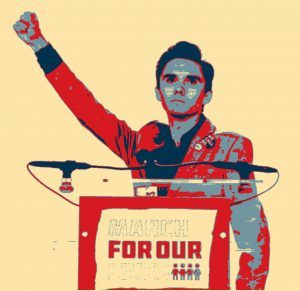 We need to talk a little more about using children as human shields in the political process, which I touched on here. The latest and most disgustingly egregious example of this is the recent March for Our Lives rally, in which the children who attended Marjory Stoneman Douglas High School gave partisan political speeches on behalf of left-wing politicians under the false flag of saving lives. If we’re going to address these issues seriously, let’s keep some basic, undeniable truths in mind:
We need to talk a little more about using children as human shields in the political process, which I touched on here. The latest and most disgustingly egregious example of this is the recent March for Our Lives rally, in which the children who attended Marjory Stoneman Douglas High School gave partisan political speeches on behalf of left-wing politicians under the false flag of saving lives. If we’re going to address these issues seriously, let’s keep some basic, undeniable truths in mind:
Experiencing a terrible event does not magically confer wisdom, no matter how terrible the event may have been. Experiencing terrible grief also does not confer moral authority on any issue. As mature adults we must sympathize, lend an ear, and offer comfort. Helping to shoulder a fellow human being’s burden is a good thing. Altering public policy on the basis of individual trauma, no matter how keenly felt, is not a good thing, particularly when those policy changes are based on emotion rather than reason.
The vast, vast, vast majority of children do not have anything incisive or original to say about public policy, including policy relating to firearms issues. They lack the experience, wisdom, and knowledge to promote a solution worth considering.
As children, we all have expressed stupid, foolish, unwise, and poorly-considered ideas. However, most of us haven’t been bankrolled by wealthy political activists from Hollywood , professionally managed by politicians , and trotted out as sages ( prophets ) dispensing wisdom.
Activists who use children as spokespeople do so because those children are considered unassailable: to disagree with a wounded child is to turn a blind eye to that child’s traumas. How dare you criticize a young, innocent child, no matter what that child says or does? This is a disgusting and deliberate attempt to use these children as human shields in America’s ongoing political struggles. It was racist to disagree with the previous president; now it’s monstrous to disagree with David Hogg.
The adults behind these children are entirely without shame, ethics, or moral character. This includes these children’s parents. They are not good people. They’re not people you’d want to associate with.
Thee children have been given free rein to say anything they like, no matter how inflammatory or sickening, because they’re “ trying to participate in American democracy.” The conclusion we’re supposed to reach is that there’s something wrong with you if you push back against the notion that you’re a bloodthirsty wannabe child killer because of your membership in the NRA. If you do anything other than sit back, nod sagely, and accept your demonization, you’re a bad person. A snowflake.
Acknowledge these truths and we can talk. Have a great Easter.







March 22, 2018
Bits and Pieces 3/22/2018
I’ve been busy of late, and when prioritizing writing tasks, the blog generally finds itself low on the list. In addition to taking on duties in my neighborhood’s Homeowner’s Association (those jackboots won’t shine themselves), I’m working on a short story I was asked to write for a literary magazine, finishing up the critical second draft of The Holy Warrior and the Last Angel, laying the groundwork for a sequel to Appalling Stories (Appalling Stories 2: Even More Appalling Stories is the working title), and editing the digital magazine Creators Unite, a quarterly publication focusing on indie art, filmmaking, and publishing.
—
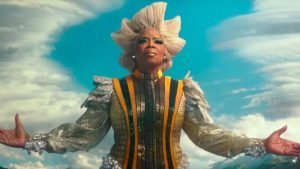 Much has been made about Disney’s movie A Wrinkle in Time, based on Madeleine L’Engle’s novel. The film has received mediocre reviews which the director has attributed in part to racism instead of deliberate choices made in production that altered the story and themes. Rather than addressing teenage awkwardness and the difficulty of not fitting in with one’s peers, the filmmakers focused on racial diversity. They removed references to the Bible and Christianity in favor of feel-good spiritualism. There’s an emptiness behind the production that viewers understand, and the quality (and box office returns) suffers.
Much has been made about Disney’s movie A Wrinkle in Time, based on Madeleine L’Engle’s novel. The film has received mediocre reviews which the director has attributed in part to racism instead of deliberate choices made in production that altered the story and themes. Rather than addressing teenage awkwardness and the difficulty of not fitting in with one’s peers, the filmmakers focused on racial diversity. They removed references to the Bible and Christianity in favor of feel-good spiritualism. There’s an emptiness behind the production that viewers understand, and the quality (and box office returns) suffers.
I read the first three books of L’Engle’s Time Quintet in middle school, and enjoyed them quite a lot, so now, decades later, I’ve begun reading them again. The depiction of Mrs Who, Mrs Which, and Mrs Whatsit as angels, as former stars, is as affecting now as it was for me then. The bizarre mixture of science, faith, and fantasy works in a way few novels can hope to achieve. Thematically, A Wrinkle in Time deals with the concept of space, of distance, of love and acceptance. A Wind in the Door goes deeper, focusing on scale, on the connection of all things within God’s plan and how everything affects everything else. And A Swiftly Tilting Planet, which I’m about a third of the way through, clearly addresses time, of the past echoing into the future. These are thoughtful books, texts that both children and adults can appreciate. But, in many respects, they reflect the Cold War era in which they were written: the Earth is a dark place, filled with the likelihood of utter doom at any time. Nuclear war, inner city violence, environmental disaster, and societal decay eat at the periphery, and the entire planet is shadowed, fighting for its life against darkness.
It’s unfortunate that the filmmakers, in their desire to update the story according to Social Justice concerns, ruined what could have been a transcendent cinematic experience. Social Justice Warriors never create new things: they burrow into existing works, eviscerate them, and demand that you appreciate the mutilation they’ve inflicted. Anything less is racism. Sexism. Bigotry.
—
The Ritual is very much a movie made by horror fans for horror fans, and on that level I enjoyed it a great deal. There’s the protagonist haunted by a terrible past failing, the irritating character who gets even more irritating as the story progresses (so he survives longer than most of the characters), the gung-ho guy who dies first, and the likable fellow who lasts just long enough for you to feel bad about his horrible demise. It doesn’t break any new ground, but if you’re looking for a good old-fashioned wilderness horror film, The Ritual‘s your best bet.







March 15, 2018
Movie Review: They Remain
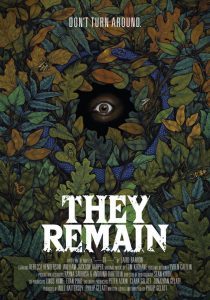 I reviewed the sci-fi/horror movie They Remain at The Slaughtered Bird:
I reviewed the sci-fi/horror movie They Remain at The Slaughtered Bird:
The plot, stretched thinner across a 102-minute span than your mother’s threadbare Sunday knickers, involves a pair of scientist/CSI-types dropped into a forest and forced to live in geodesic dome-like structures while they set up cameras to study animal behavior and dirt in the wake of a mass murder committed by a Manson-like cult some time ago. I think. This may take place in the future, though it’s not certain. The main characters may have had a romantic relationship prior to the events of the movie, but it’s not certain. The cult may still be out there, but it’s not certain. What is certain is that the film doesn’t give you the slightest reason to care about what happens. We don’t know the stakes. We don’t know what’s really happening. We don’t know why. The only thing that isn’t ambiguous about this movie is my frustration with it.
For the rest of the review, including several other bon mots, click here!







March 12, 2018
Appalling Stories: Excerpt
Harrisburg United Against Hate had met with the mayor to ensure there’d be no police presence. Once the media got wind of the agreement, they decided to avoid the event. They hadn’t fared well with HUAH during its previous operations.
The noise of shoes echoing off the pavement mixed with a jumble of shouting and chanting. An unmistakable voice rose above it all. “Violence against hate isn’t violence!”
Movie star Ciara Jacobs was only seven paces ahead in her sleeveless white T-shirt and form-fitting jeans. Haley smiled, pleased that they were similarly-dressed. Of course, her tee and jeans were nothing like Ciara’s. And Ciara wore oversized hiking boots while Haley had on an old pair of cross-trainers. But she didn’t care about the differences: just being close to her gave her a charge.
Ciara’s black hair was up in a bun and she wore sunglasses that must have cost at least four figures. Two bodyguards and a personal assistant filming with a smartphone kept pace with her. The bodyguards made sure Haley couldn’t get any closer than five feet even when she hurried to catch up.
Soon others started chanting, “Violence against hate isn’t violence!” and it became the chant for the remainder of the march.
Haley joined in as Harrisburg United Against Hate reached the first intersection. Some halted and wanted to help stop traffic, but others barreled on through. That emboldened everyone and once they crossed the intersection, they moved off the sidewalk and into the street.
All traffic on North Fourth Street had to stop for the mob that totaled over a hundred people. As they reached the next intersection, still chanting, Haley caught a glimpse of the rally point.
“Hey,” she said to a kid in a black ball cap. “Who’re we going after today, anyway?”
He stopped chanting and told her, “They’re called WBP. I think it stands for We’ve Been Patient.”
“Ever heard of them before?”
“Nah,” he said, shrugging. “But who cares, right? They say they oppose progress on all the important issues. How outrageous is that? I mean, hate is hate and someone has to stop them.”
(Taken from Our Violence Isn’t Violence by Paul Hair.)
—
This story, along with twelve other hard-hitting tales of science fiction, satire, horror, and more are available in Appalling Stories: 13 Tales of Social Injustice!







March 7, 2018
Moral Laziness in the 21st Century
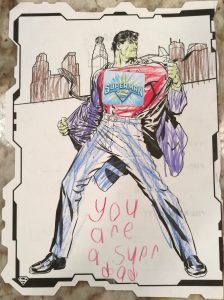 My little boy gave me this the other day, apropos of nothing at all. According to my moral betters, I love my guns more than I love him.
My little boy gave me this the other day, apropos of nothing at all. According to my moral betters, I love my guns more than I love him.One thing social media has been good for is the exposure of the national id onto a public forum. A gigantic segment of our population has grown comfortable expressing knee-jerk reactions to current events as though such feelings were worthy of consideration by thoughtful adults. They’re not. They never were. First-response moralizing, particularly in the face of horrors like the Parkland murders, is in all cases childish, unwelcome, and empty of meaning.
And yet it’s out there and gotten legs, so we have to address it.
In the wake of Parkland it’s become daring, brave, or somehow original to express the idea that children shouldn’t be murdered, particularly when they’re at school. (“I just want the kids to be safe.”) It’s also become quite the thing to tell the world that children should have a safe place to learn. This is the default, least courageous position to take on any issue ever conceived of, because it’s inarguable. Bravo. You’ve gone out on a limb with the easiest moral stance. Take a bow.
Virtue-signaling on this (or any) issue is unspeakably lazy. It leads to the ugly claim that people who disagree with you on how school safety is to be achieved actually don’t care if children are murdered or not. It leads to false choice fallacies like, “Your gun fetish gets our children killed.” And it leads to large numbers of supposedly thoughtful and mature people blaming the NRA for crimes they literally had nothing to do with.
The serious conversation about guns that we apparently need to have can’t happen because the people who keep insisting on having that serious conversation are fundamentally unserious. Driven by emotion, by the id that demands that the scary thing be taken away at all costs, their intent isn’t to talk, but harangue. To shriek, with hands over ears, until everyone else capitulates. That’s not a conversation.
 Once you’ve ascended the high, lonely moral pedestal of “No more child murders,” you’ve also concluded that few others share your rarefied air, and you can then demonize them to your swollen heart’s content. And you do demonize them. I’ve seen it. It led me to join the NRA myself. In all likelihood, I’m the only person in my entire family to have done so. I did it not because I’m particularly brave or have any love for the NRA, but because I can’t stand the shrieking, hysterical demonization from people whose moral authority is entirely self-derived.
Once you’ve ascended the high, lonely moral pedestal of “No more child murders,” you’ve also concluded that few others share your rarefied air, and you can then demonize them to your swollen heart’s content. And you do demonize them. I’ve seen it. It led me to join the NRA myself. In all likelihood, I’m the only person in my entire family to have done so. I did it not because I’m particularly brave or have any love for the NRA, but because I can’t stand the shrieking, hysterical demonization from people whose moral authority is entirely self-derived.
This is why politicizing every tragedy is such a terribly poisonous thing. We’ve elevated our politics to a moral level, rather than seeing it as a function of group decision-making. If you call others unethical reprobates because they disagree with your political solution to a moral problem, then yeah, you’re going to go the extra mile and claim that these unethical reprobates love guns more than they love their children.
Limiting freedoms enshrined in the U.S. Constitution, a political document, is an expressly political act. Calling it a moral imperative because you happen to be one of the brave few who doesn’t want to see “our” children get murdered at school doesn’t make it a moral imperative. We can disagree on gun ownership in the United States, and if you have the stomach for it, you can try to use the engine of politics to see your point of view formed and flaked into policy. But what you can’t do is claim that your emotional, knee-jerk reaction is the right and proper moral choice in these dark times. Your moral default is neither brave nor inspiring, and you deserve no credit for it. It’s unfortunate that your teachers, parents, and mentors haven’t taught you this, but it’s the truth, and you’re better off knowing it.
Get out there and repeal that Second Amendment. Ban the things that frighten you. Use the power of the state to disarm us all. But don’t fool yourself into believing that your politics are anything more than childish emotionalism, and stop congratulating yourself for assuming the default moral position. You’re not special; you’re just lazy.











